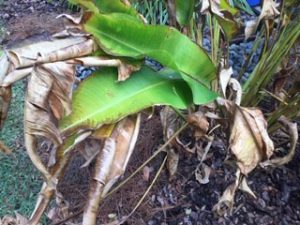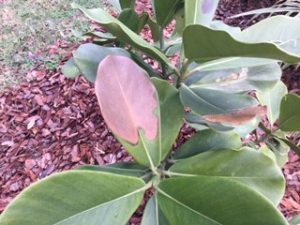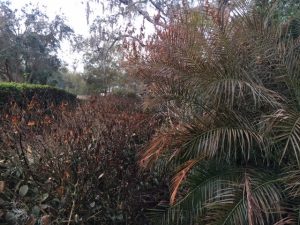There were quite a few cold nights during January and February this year and many of our landscape plants suffered frost and/or freeze damage. But what does that look like and what should you do about it?

Frost and freeze can look very similar to other types of damage in the landscape so it helps to know what plants are sensitive to cold temperatures so that you can properly identify the damage.
One you determine that the plant has suffered frost or freeze damage, you may wonder if the plant is dead and should be removed. The answer to that is usually no. Most plants will not completely die from frost or freeze damage (some will of course, but most landscape plants will not) and will come back once the weather warms up in the spring. The important thing to remember is to not cut back the damaged foliage until danger of cold temperatures have passed. This is often mid-March for central Florida gardeners. Cutting back damaged foliage encourages new growth, and that new growth is particularly susceptible to frost and freeze should either occur again.

Additionally, after the danger of frost and freeze have passed, there is no need to apply additional water or fertilizer. The plant will recover on it’s own, just give it time.
If you have questions about frost and/or freeze damage, contact UF/IFAS Extension Polk County at (863) 519-1041 or visit us online at http://sfyl.ifas.ufl.edu/polk. The Plant Clinic is open Monday-Friday, 9:00 am-4:00 pm to answer your gardening and landscaping questions. Give us a call, or email us at polkmg@ifas.ufl.edu.
If you are not in Polk County, Contact your local UF/IFAS Extension Master Gardener Volunteer Plant Clinic.

The Florida Master Gardener Volunteer Program is a volunteer-driven program that benefits UF/IFAS Extension and the citizens of Florida. The program extends the vision of the University of Florida/Institute of Food and Agricultural Sciences, all the while protecting and sustaining natural resources and environmental systems, enhancing the development of human resources, and improving the quality of human life through the development of knowledge in agricultural, human and natural resources and making that knowledge accessible.
An Equal Opportunity Institution.
 1
1
